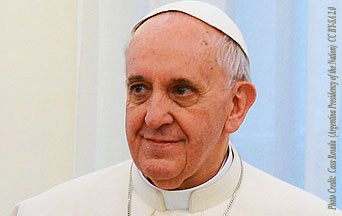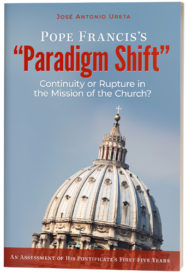
On March 7, 2019, Pope Francis caused new scandal with the statement that the Church was “surprised in flagrant adultery!”1
Regrettably, this is not the first time that Francis scandalizes Catholics (and many non-Catholics) with shocking statements and attitudes opposed to the Gospels, Church Tradition, and the common sentiment of the faithful.
Thus, before delving into an analysis of this statement, it seems useful to recall a few others along the same line of abandoning traditional Catholic doctrine. For the sake of brevity, we will cover only the last six months.
A New Mariology and Concept of God
October 2018: Francis stated that Mary Most Holy was “a normal girl, a girl of today… normal, normally educated, open to marrying, to having a family,” with nothing “exceptional in her life.”2
December 21, 2018: On December 21, 2018, the Pope stated to Vatican employees, “Our Lady and Saint Joseph! Yes, but let us not think it was easy for them: saints are not born, they become thus, and this is true for them too.”3 Now, to say that the Blessed Virgin was not born holy is an implicit denial of the dogma of the Immaculate Conception.4
10 Razones Por las Cuales el “Matrimonio” Homosexual es Dañino y tiene que Ser Desaprobado
January 27, 2019: During the Panama World Youth Day (WYD), the Pope attended and enthusiastically approved a sacrilegious skit5 that interpreted his new, egalitarian Mariology.6
February 4: Along with an Egyptian imam, Francis signed a document stating that, “the pluralism and the diversity of religions, color, sex, race and language are willed by God in His wisdom, through which He created human beings.”7
God cannot want the existence of false religions because He cannot want both truth and error, good and evil. If that were so, He would be a contradictory being, and a contradictory being cannot be God, Who is eternal Wisdom, supreme Truth, and Goodness.8
A New Teaching on Death Penalty
December 17, 2018: he affirmed that the death penalty “is always inadmissible,” it is “contrary to the Gospel.” This is tantamount to saying that the death penalty is intrinsically evil. But this runs counter to the natural law and Revelation.9

Purchase the Book here (Free Shipping).
Denying the Church’s Holiness
March 7, 2019: Finally, as Lent began, Francis gave a meditation to the clergy of the Diocese of Rome. Commenting on the sexual scandals involving ecclesiastics, he said that, through the shame caused by such scandals, “the Lord is purifying His Bride… He is blowing His Spirit to give back beauty to His Bride, taken in flagrant adultery.” And he concluded, “It will do us good to take up today chapter 16 of Ezekiel. This is the history of the Church.”10
To present the “glorious Church, not having spot or wrinkle, or any such thing” (Eph. 5:27) as an adulteress caught red-handed on account of the current clergy sex scandals is not only absurd but impious.
About the aforementioned text by Ezekiel, the great exegete Cornelius a Lapide (1567–1637), says: “Under the aspect of an adulteress is described the birth and the rearing of Jerusalem, that is the Synagogue, and its adultery, that is, idolatry.”11
Therefore, in this passage, the prophet is describing the history of Synagogue, not that of the Church.
Eternal and Natural Law: The Foundation of Morals and Law
To say that the history of the Church is that of an adulteress and that the Spouse of Christ has been caught in flagrant adultery is tantamount to claiming that she lacks one of the essential marks of the Church of Christ: Holiness. If she is not holy and Her history is one of adultery (idolatry), which continues to this day, she cannot be the Spouse of the “spotless unblemished lamb” (1 Pet. 1:19).
Likewise, if She is not holy, She cannot sanctify, and therefore the Sacraments are worthless. If She is an idolater, Her doctrine leads to perdition and not to salvation. In simple terms, She is a false Church, which does not lead souls to salvation but has a bad influence on society. Therefore, it has to be repressed or even suppressed.
The Sin of a Member Does Not Affect the Church’s Holiness
How can one explain that the sin of a member of the Church does not affect her?
The answer lies in the twofold reality of the Church, both supernatural and natural, divine and human.
The visible human element is subject to the effects of both Original Sin and the state of trial on this Earth. This human element of the Church is subject to sin, even when vested in the priesthood or the loftiest dignities of the hierarchy.
However, there is an important distinction. When a member of the Church sins, he does not sin as a member of the Church or because of the Church. He sins because he is unfaithful to Her principles and to the life of grace She generated in him.
 Learn All About the Prophecies of Our Lady of Good Success About Our Times
Learn All About the Prophecies of Our Lady of Good Success About Our Times
A sinner is, therefore, a bad member of the Church, who diverges from Her by sinning. As long as he retains the Faith, his divergence is partial. He is an unhealthy member of the Church—like a tumor in a living body, to use Saint Augustine’s realistic comparison.
Though he is a wilted branch attached to the vine, the sinner nevertheless preserves in himself some elements of holiness, the mark of Baptism, Faith, and Hope. In him, this holiness is the part belonging to the Church and it sustains him as a member. The sin, which separates him from Her, makes him a son of the devil, in Saint John’s strong words (1 John 3:8–10).
The Church’s Holiness
The Church’s holiness derives from Her principles, sacraments, and hierarchy as established by Our Lord.
Fr. Christiano Pesch, S.J., sums it up quite well:
“Christ established the Church holy, that is, to sanctify men (John 7; Eph. 5:26–27; Titus 2:14), and for this end He gave her internal and external means of sanctification: a holy doctrine, holy precepts, holy government, holy sacraments. Now then, ‘every good tree bears good fruit.’ (Matt. 7:17), especially when it comes to supernatural and divine virtues. Therefore, there will always be holy men in the Church and not only with common sanctity but also with outstanding sanctity. Otherwise Christ’s prayer ‘that they also be sanctified in truth’ (John 17:19) would be to no avail. Nor will there be a lack of those who follow the evangelical maxims (Matt. 19:12, 21; 1 Cor. 7:25). Nor will signs of charismatic holiness [miracles], which Christ promised, cease to exist in the Church (Mark 16:17; John 17:22; 1 Cor. 12).”12
Science Confirms: Angels Took the House of Our Lady of Nazareth to Loreto
Saint Paul proclaims the sanctity of the Church and says that Christ’s love and immolation on Her behalf is the cause of Her sanctity: “Christ also loved the church, and delivered Himself up for it; That He might sanctify it, cleansing it by laver of water in the word of life: That He might present it to Himself as a glorious church, not having spot or wrinkle, or any such thing; but that it should be holy, and without blemish (Eph. 5:25–27).”
Glorious, the Church Rises Again From Her Trials
Let us hold fast to the Faith and our love of the Church. For, as Prof. Plinio Corrêa de Oliveira once said, “Christ died and rose again. The immortal Church rises from Her trials, glorious like Christ, in the radiant dawn of His Resurrection.”13
Footnotes
- “Francis Besmirches and Humiliates our Spotless Mother, the Holy Catholic Church,” Rorate Coeli, Mar. 8, 2019, https://rorate-caeli.blogspot.com/2019/03/francis-besmirches-and-humiliates-our.html; See also, “In Annual Lenten Tradition, Pope Addresses Clergy of Rome (Full Text),” Zenit, Mar. 11, 2019, https://zenit.org/articles/in-annual-lenten-tradition-pope-addresses-clergy-of-rome-full-text/; Pope Francis, “Meditazione del Santo Padre Francesco,” Vatican, Mar. 7, 2019, http://w2.vatican.va/content/francesco/it/speeches/2019/march/documents/papa-francesco_20190307_liturgiapenitenziale-presbiteriroma.html.
- Pope Francis, “La Chiesa è popolo, l’élite il peccato,” Corriere della Sera, Oct. 7, 2018, https://www.corriere.it/cronache/18_ottobre_07/papa-francesco-chiesa-popolo-elite-peccato-2ab8a8ce-ca64-11e8-8417-701d201b7018.shtml. See Luiz Sérgio Solimeo, “Pope Francis’s ‘Sin of the Elite’ and New, Egalitarian Mariology,” TFP.org, Oct. 29, 2018, https://tfp.org/pope-franciss-sin-of-the-elite-and-new-egalitarian-mariology/.
- Pope Francis, “Christmas Greetings to the Employees of the Holy See and of Vatican City State,” Dec. 21, 2018, http://w2.vatican.va/content/francesco/en/speeches/2018/december/documents/papa-francesco_20181221_dipendenti-vaticani.html. (Our emphasis.)
- See Luiz Sérgio Solimeo, “A Sacrilegious Parody of the Annunciation and Pentecost at the 2019 World Youth Day,” TFP.org, Feb. 3, 2019, https://tfp.org/a-sacrilegious-parody-of-the-annunciation-and-pentecost-at-the-2019-world-youth-day/.
- Ibid.
- See Solimeo, “Sin of the Elite.”
- “A Document on Human Fraternity for World Peace and Living Together,” Feb. 4, 2019, http://w2.vatican.va/content/francesco/en/travels/2019/outside/documents/papa-francesco_20190204_documento-fratellanza-umana.html. (Our emphasis.)
- See Luiz Sérgio Solimeo, “Theological and Canonical Implications of the Declaration Signed by Pope Francis in Abu Dhabi,” TFP.org, Feb. 27, 2019, https://tfp.org/theological-and-canonical-implications-of-the-declaration-signed-by-pope-francis-in-abu-dhabi/. In an interview to LifeSiteNews, Bishop Athanasius Schneider, auxiliary of Astana, Kazakhstan, reports that at his recent ad limina visit he discussed with Francis the claim that the “diversity of religions” is “willed by God.” The Pope said that he was talking only about God’s permissive, rather than positive, will. Bishop Schneider argued that, in that context speaking about sex, race and religion one could not understand that statement as referring solely to God’s permissive will, for differences of sexes and races are positively willed by God. The Pope is said to have agreed with him. (See, Diane Montagna, “EXCLUSIVE: Bishop Schneider wins clarification on “diversity of religions” from Pope Francis, brands abuse summit a “failure,” LifeSiteNews, Mar. 7, 2019, https://www.lifesitenews.com/news/bishop-schneider-extracts-clarification-on-diversity-of-religions-from-pope-francis-brands-abuse-summit-a-failure.
- See Luiz Sérgio Solimeo, “Pope Francis’s Teaching on the Death Penalty: A Rupture With Divine Revelation and the Church’s Constant Teaching,” TFP.org, Jan. 13, 2019, https://tfp.org/pope-franciss-teaching-on-the-death-penalty-a-rupture-with-divine-revelation-and-the-churchs-constant-teaching/.
- “In Annual Lenten Tradition,” (Our emphasis.)
- Cornelius a Lapide, Commentaria in Scripturam Sacram, in Ezechielem Prophetam, ch. 16 (Paris: Vivès, 1880), 602.
- Christiano Pesch, S.J., De Ecclesia Christi, in Compendium Theologiae Dogmaticae (St. Louis: Herder, 1913), 1:172. (Our emphasis.)
- Plinio Corrêa de Oliveira, “Páscoa,” O Legionário, no. 660, Apr. 1, 1945, https://www.pliniocorreadeoliveira.info/SSTA_45-04-01_Pascoa.htm.

